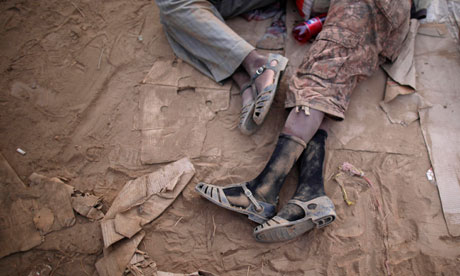particularly among youths, across Africa to Libya and Eu

The government of the self-declared republic of Somaliland will stiffen penalties for people smuggling and human trafficking to stem irregularmigration, particularly by the region’s youths.
The interior ministry’s administrative director, Mohamed Osman Dube, told IRIN: “There is an article in Somaliland’s penal code dealing with this issue, but we think it is not deterrent enough. For this reason, the government plans to pass new laws to prevent human smuggling.”
Article 457 of the penal code identifies the selling and purchasing of humans as slaves as offences punishable by prison terms of three to 12 years. Article 466 further provides for a three-year prison term for those found guilty of engaging in physical abuse, according to Mustafe Mahdi, a Somaliland lawyer.
The laws are aimed at reducing irregular migration from Somaliland to Ethiopia and onwards to Sudan, Libya and Europe. They are expected to include tougher punishments for smugglers and provide ways to rehabilitate youth migrants, Dube said.
Though reliable figures on people smuggling and human trafficking in Somaliland are not available, in late June, the Somaliland president, Ahmed Mohamed Mohamoud Silanyo, nominated a ministerial committee to address the problem, expressing concern over growing youth mass migration and related deaths.
According to a recent survey by the community-based Somaliland Youth Ambition Development Group (SYADG), for example, at least 15 Somaliland youths died in May in the Sahara desert, between Libya and Sudan, either because they were shot dead by smugglers or due to the harsh conditions. The 15 were part of a group of 325 youths, from which 31 are missing, with 83 and 80 others in Libyan and Tunisian prisons, respectively, according to the group’s spokesman, Ahmed Jamal.
Targeted
Most of the youths migrating from Somaliland have been from poorer families, but those from wealthier backgrounds are increasingly risking the perilous journey to Europe.
Mohamed Da’ud, the interior ministry’s director of planning, said: “When I was looking for my son, I received a phone call from a stranger asking me to speak my son. The stranger told me to pay him $5,000 [£3,250] in smuggling fees. I said: ‘I will look for the money’, but unfortunately, my son was shot dead. He is among youths who have been killed by smugglers or [who] died in the Sahara after they tried to run away from smugglers.”
Wafa Alamin, a human rights activist in Khartoum, Sudan, said: “Illegal immigrants are treated like animals by the smugglers in the Sahara, between Sudan and Libya.”
Smugglers are also increasingly kidnapping migrant Somaliland youths for ransom. Abdillahi Hassan Digale, the chairman of the Ubah Social Welfare Organisation (USWO), said: “The youths are asked about their parents’ properties and jobs. If the smugglers identify that the family of the person can pay a ransom, they take him or her across the border without any payment only to later force the client to call his or her family to demand a ransom.”
Abdillahi Omar’s sons are among the smugglers’ victims. “My two sons graduated from high school in 2011 and had no reason to risk their lives,” he said. “I sent one of them to university in Ethiopia, but he saved up the money I used to send him to make the risky journey to Libya. On different occasions in Sudan and Libya he was held hostage by smugglers who demanded a ransom, and I spent $14,500 on him. But he is lucky he reached Europe.”
His other, younger son is in Libya. “I don’t know what to do. I sold everything I had. My problem is not only being bankrupt but that I don’t know how to bring him back,” Omar said.
Way forward
The government, civil society and international organisations have been engaging in public awareness campaigns to sensitise the Somaliland population to the dangers of irregular migration.
But more needs to be done. A Somaliland border immigration official, who spoke on condition of anonymity, said: “Even though a lot of campaigns have been done, [especially] in the last several weeks, and youth migrants have decreased from 15 per day to eight per day, we believe that there are local smugglers connected to other smugglers based in Ethiopia, Sudan and Libya, and we don’t think it will stop soon.”
The high rate of unemployment in Somaliland, amid an increasing number of university graduates, must be addressed, according to Digale. “For this reason, there is a need for interventions by both the government and the local business community, as well as international partners working in Somaliland,” he said.
An earlier survey by the Somaliland National Youth Organisation found about 75% youth unemployment.
The International Organisation for Migration (IOM) is implementing a regional mixed migration programme covering Djibouti, Ethiopia, Puntland, Somaliland and Yemen. In mixed migration, refugees, asylum-seekers, economic migrants and even victims of human trafficking use the same routes, means of transport and smuggling networks to reach shared destinations, but with different claims to protection and humanitarian assistance.
IOM Somalia said: “The overall objective of this programme is to strengthen the protection of – and provide emergency assistance to – irregular migrants in Somaliland, Puntland [and] Djibouti, and potential migrants and returnees in Ethiopia, including the assisted voluntary return of the most vulnerable.” Ethiopia is a leading source of irregular migrants from the Horn of Africa region heading to the Arabian peninsula.
IOM Somalia is also urging Somaliland to accede to the Palermo protocol, which aims to prevent the smuggling of migrants, promote co-operation among state parties, protect the rights of smuggled migrants, and prevent the worst forms of exploitation, which often characterises the smuggling process.
On 17 July, Somaliland officials prosecuted 11 people on human smuggling charges. Gabiley regional court found the 11 men guilty of smuggling youths from Somaliland to Ethiopia en-route to Libya, according to an official at the immigration department. The arrests and prosecutions were the first of their kind in Somaliland.
Source theguardian.com














